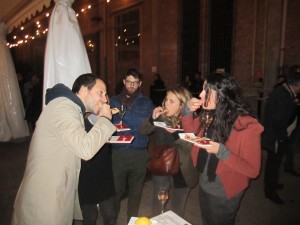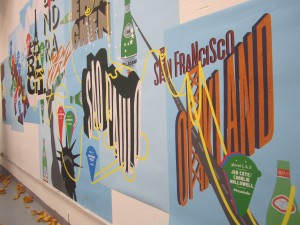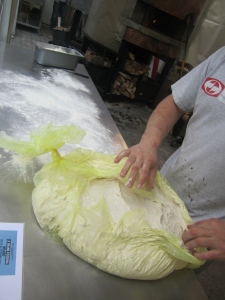 1. It is not actually called Fancy Pants Mountain. If you are unable to stop calling it Fancy Pants, because you cannot either remember or pronounce its real name, take this a sign.
1. It is not actually called Fancy Pants Mountain. If you are unable to stop calling it Fancy Pants, because you cannot either remember or pronounce its real name, take this a sign.
2. Fansipan Mountain is the highest peak in Indochina (which sounds totally colonialist, but what the hell do you call the Vietnam-Cambodia-Laos region: “the region formerly known as Indochina”? RFKAI?) As such, you’ll be trekking up. As in, UP UP. It’s only a 15km trek up and you’ll probably think, “I’m back to jogging 10km a few times a week, I can toooootally handle it.” Kilometers are for suckers anyway.
It may be worthwhile to listen to your own bullshit detector.
3. Everything you read prior to the trek will use grandiose-sounding verbiage such as “conquering Fansipan Mountain.” You’ll think this is an overly zealous translation. You’ll also read that at the trek’s completion, you’ll receive a certificate verifying that you’ve “conquered Fansipan Mountain.” You’ll think this is a product of the Vietnamese affection for paperwork.
But consider this. Really consider this.
4. As the highest peak in RFKAI, Fancy Pants Mountain will be cold. They’ll tell you this: “It’s cold up there.” Remember you haven’t been in anything close to “cold” in a nearly two years. Briefly consider the fruitless time and effort you’ve invested in finding clothing that fits you in this country. Decide not to bother trying to get real hiking boots or weather-resistant clothing. Borrow some long pants from your roommate, and put on your three-year-old trainers and a pair of leggings and DO THIS SHIT.5. Consider the fact that you are not a good trekker. You don’t even really enjoy trekking. Remember La Ciudad Perdida? Yosemite’s Half-Dome? All those Muir Woods day hikes your parents took you on as a kid? You have never for one second liked trekking, or been any good at it.
Despite this, “getting out of the city” will seem like a good idea. Consider briefly of the itinerary: an overnight train; arrival at 6am; trek beginning at 9am; the trek; sleeping in a “longhouse”; trekking back; overnight train back to Hanoi at 7pm.
Consider that this is your weekend.
Or don’t. Buy some bottled water and a granola bar, put on your three-year-old trainers and a pair of leggings and DO THIS SHIT.
6. Dream about Roberto Bolano on the overnight train. Dream you’re sitting around a table at a youth hostel, freestyling short stories; dream that he is staring at you across the table.Wake up giddy and in a puddle of your own drool. Consider how many times people must have woken up in puddles of their own drool ON THIS VERY PILLOW, whether or not they were dreaming of Roberto Bolano. Rinse your face; chug from the plastic bottle; swish the water in your mouth and spit it out; look at yourself in the foggy scratched mirror, your reflection foggy and scratched.
Think: “Let’s Do This Shit.”
7. Doing This Shit:
i. The trail will be muddy. Like, mad muddy. Shlup, shloop, gloop, glup, ankle-deep and sliding around, falling-in-the-shrubbery muddy. The porters will hand you a walking stick; this stick will become your best friend, despite the little blisters your own clutching causes.
ii. The trail will be foggy. You won’t be able to see shit, not more than a few meters in front of you or behind you.
iii. The trail will be rocky. It will not really be a trail so much as a series of rocks to climb up. Really, it should be called The Fancy Pants Mountain Rock-Climb, not a trek because you don’t actually get a good stride going very often.
iv. Your feet will get wet and muddy. It’s better to just accept it and slosh through than try and fight it. It’s faster too.
v. The porters won’t speak English, so it’ll be best to go with a group of people who speak Vietnamese. Though Vietnamese won’t be the native language of the porters; they’ll speak Hmong. The porters will speak Hmong because they’ll be Hmong, and it’ll be the only trek you’ve been on with a female porter.
She will be a bad ass. Like, the definition of a bad ass: big phat tribal earrings the kids in SF would pay $300 for; knee-high rubber rain boots; skirt tied with a sash; sturdy-ass legs from doing this trek a minimum of TEN TIMES A MONTH, your friends will translate. All your food and gear will be stowed in a whisker basket she totes on her back. She’ll smile and have three gold teeth; you’ll think about how you miss gold teeth, seeing just a few as opposed to a whole goddamn grill the kids are sporting these days. Her fingers will be stained, black-rimmed nails, and she’ll never be out of breath.
Consider that she will be the coolest part of the trek.
vii. After seven hours you’ll arrive at the 2800 meter point. Consider you won’t know what this translates to in feet; consider that you won’t care.
You’ll go into the longhouse where you’ll be sleeping and it will no shit be one of the most squalid places you’ve ever seen. Consider that you’ve slept in some squalid situations, both urban and rural; consider that an old boyfriend lived in a West Oakland punk house called Dead Rat Beach. Consider that this longhouse will be worse than that.
Consider: the walls made of aluminum, a material that traps and magnifies the cold; the gaping hole in the door of the aluminum, through which a howling wind straight from the cold chest of China enters; the muddy-ass walkway; the raised wooden sleeping platform, damp from the cold; the trash beneath the sleeping platform; the scurry of the rats beneath the sleeping platform; the thin sleeping bags they’ll give you; the fact that the sleeping bags don’t zip; the fact that this trek has become mega popular with Vietnamese young people and that a group of sixteen with enter the house a couple hours after you do and that they will, in full Vietnamese fashion, talk and point and shout at each other for 6 of the 8 hours you attempt to sleep, and that this will annoy even the Vietnamese people you’ve come with.
Consider that the dinner will be nice, quite tasty really, more Chinese than Vietnamese, and that you’ll gorge yourself by the candlelight and that one of your trekking mates will have brought a bar of Toblerone and that he’ll break you off a chunk and HOLY SHIT that’ll be the best piece of Toblerone you’ve ever tasted.
Consider that you don’t even really like Toblerone. Consider that.
viii. Consider that the toughness-to-reward ratio of the trek will be low enough to inspire you skip the “conquering” bit. You will not get up at 5am will the others in your group and carry on to the top, but cuddle up and clench your eyes against the swimming of the flashlights, clamp your ears against the shouting of the other trekkers, and shiver inside your unzipped sleeping back, inside your roommate’s pants and the leggings you haven’t changed out of.
You’ll head down the mountain around 8am with another girl in your group who has also bailed. Only now will you consider that the whole “I did it!” thing has never been a motivation for you. Only now consider that on the treks you’ve done in that past, you’ve never felt the swoon of accomplishment, victory over a physical challenge, but more of a “Now why did I put myself through THAT?”Consider that you’ve always felt life was hard enough without CLIMBING A FRIGGIN MOUNTAIN on your weekend. Consider that the real “I did it!” for you is and always had been the everyday survival—the existing in the world—not this outdoor mountain shit. Consider that the real victory for you is the fact that you’ve damn near made it to 30 without killing yourself.
Consider that as you slip and slide and crawl on your ass back down the mountain.
Consider that the way down is always harder than the way up. Consider how that’s a metaphor. For all of it.
8. The best part of the trek will be when it’s over. You’ll get back to Sapa, a lovely little town you wish you had the energy to explore, and you’ll feel like you’ve been gone longer than 30-some hours. Since your friend arranged the whole thing through a tour agency, you’ll have access to a hotel room with a shower. It’ll be a dingy little hotel room with the same faded pink paint as your apartment in Phnom Penh, but the water pressure will be strong and the water will be hot and HOLY SHIT it’ll be the best shower you think you’ve ever taken. Consider that you like hot, strong showers, and have taken a lot of them.
Stagger across the road to a touristy cafe and order a burger, fries and a chocolate shake. Consider the last time you indulged in this trifecta; consider that you won’t be able to remember and that you won’t care. Consider that the shake will be a literal interpretation of a shake—milk and chocolate powder that were seemingly stirred together—and that it’ll still taste goddamn amazing.
9. Consider the train ride back. Despite the fact that the AC in your cabin won’t be working, you’ll konk out at 8pm. You will not dream about Roberto Bolano, and you will feel slightly ripped off by that.
You’ll arrive back in Hanoi at 5am, all matted hair and lip crust, everyone in your group too tired and sore to give proper goodbyes. You’ll hop on the back of a xe om, whiz through the sleepy pre-dawn streets.
You won’t have conquered Fancy Pants.
You won’t have conquered shit.
But goddammit, you’ll be on your way to conquer your own friggin bed.
You’ll pay the dude, slither down the alley, yank open the gate, crawl up the stairs and HOLY SHIT you will.
*
If you’ve considered all this and still want to do the trek, check out Mien’s much more informative and much less whiny post on the expedition.








































































Recent Comments